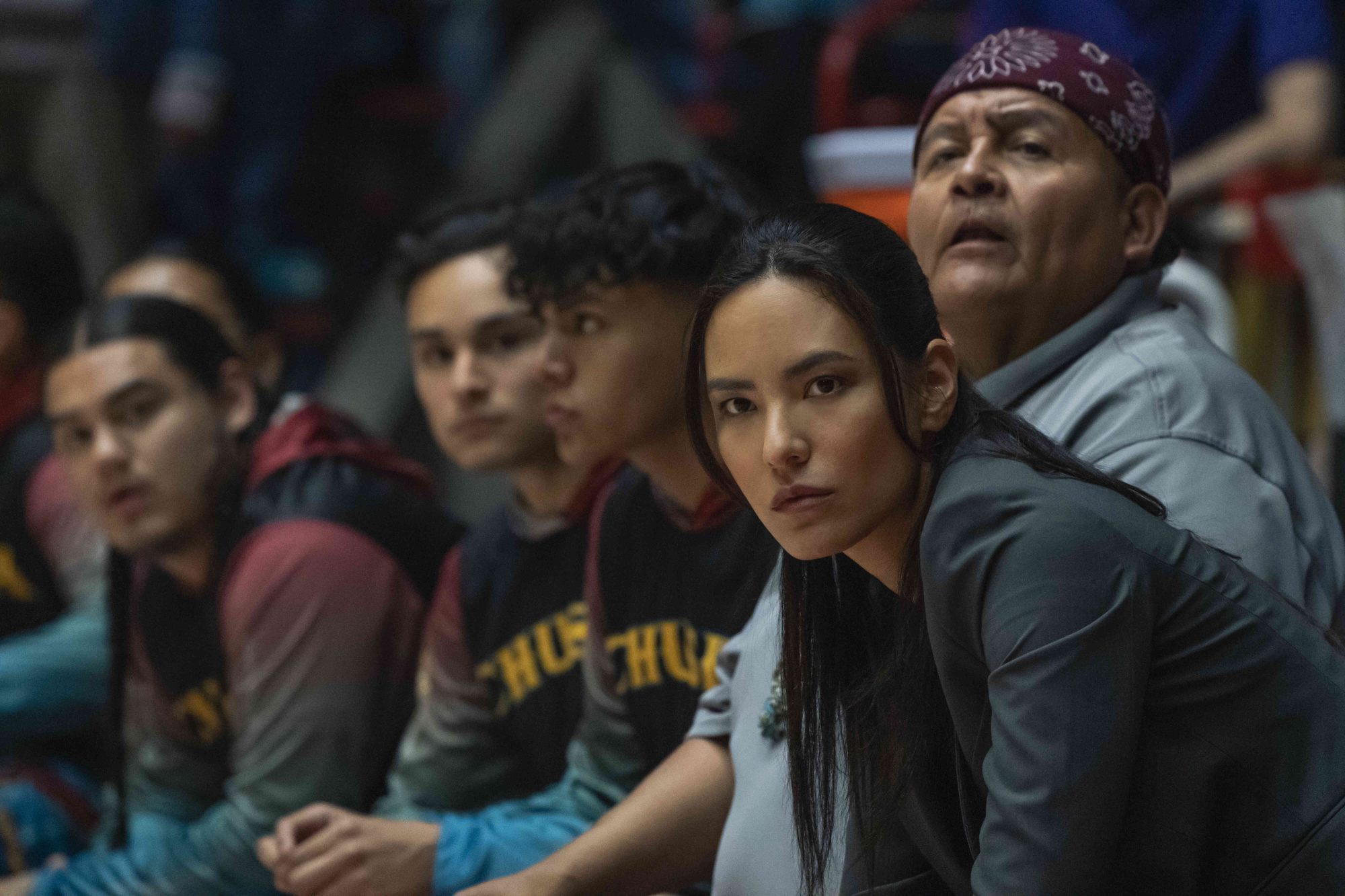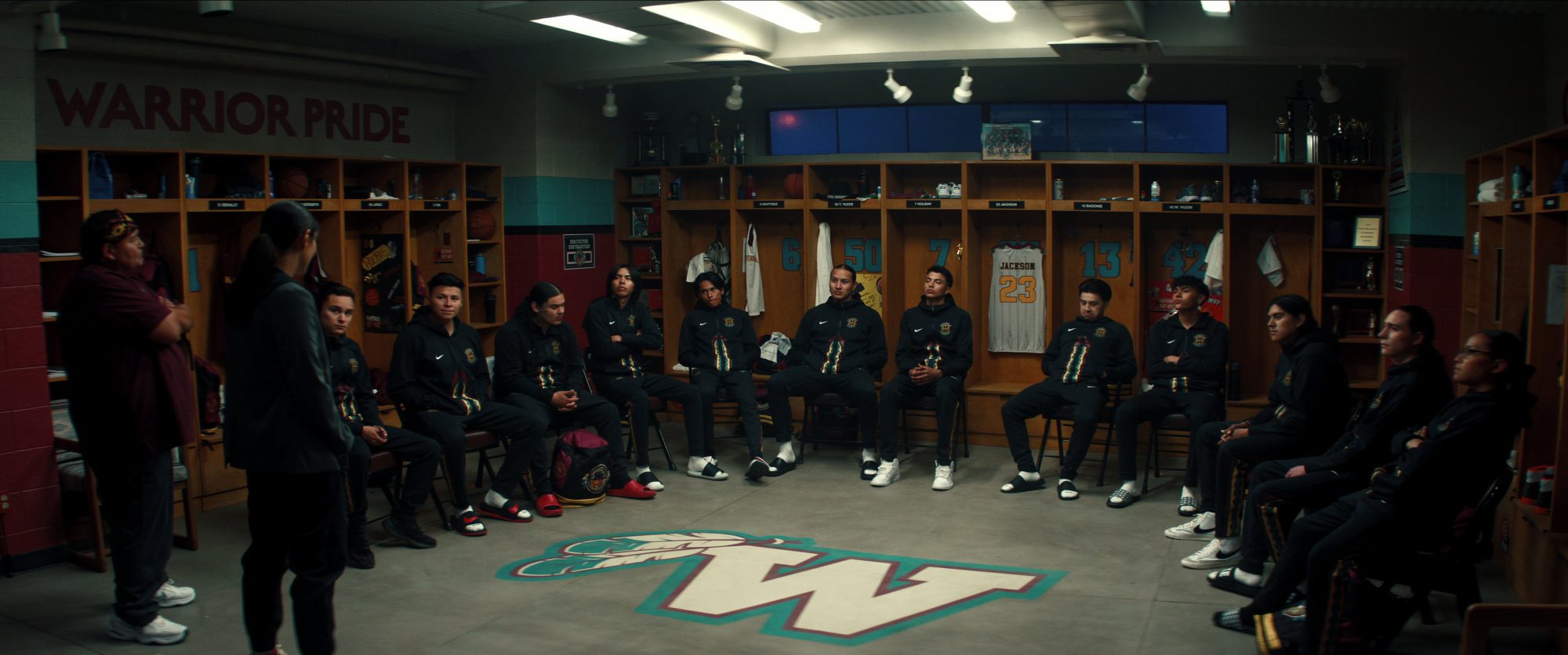In an era where diverse storytelling is more crucial than ever, Jessica Matten stands out as a powerful advocate for authentic Indigenous representation in film and television. Her work sheds light on stories that often go untold, bringing depth, resilience, and visibility to Indigenous characters and communities. Matten’s latest role in Netflix’s Rez Ball (which debuted at the Toronto International Film Festival this year) builds on her mission, offering audiences a fresh and genuine portrayal of Indigenous life through the lens of sport and community. Inspired by Michael Powell’s novel Canyon Dreams, the film follows a high school basketball team from a Native American reservation as they chase their dreams against all odds.
In Rez Ball, Matten embodies resilience and strength as Coach Heather Hobbs, a role that goes beyond basketball to explore the heart of Indigenous community and mentorship. Speaking with GLORY, Matten delves into the film’s powerful themes of hope, intergenerational healing, and identity. Through the lens of sport, Rez Ball captures the spirit of a community overcoming trauma and celebrating unity.


Basketball in Rez Ball feels like more than just a sport; it’s a cultural touchstone. How do you think the film captures that deep connection between sport and community?
Jessica Matten: Thank you! I think basketball is universal in how it brings communities together, not just Indigenous ones. In this film, basketball really plays the role of a beacon of hope, especially in Indigenous communities where it offers something to look forward to, a source of pride. Many Indigenous communities suffer from intergenerational trauma, and basketball becomes a glimmer of hope, a way for people to build confidence and celebrate something positive.
Your character, Coach Heather Hobbs, is such a compelling figure. What did you admire most about her when you were preparing for the role?
Jessica Matten: I loved Heather’s resilience. Being a woman coach on the reserve, in a role that’s generally male-dominated, she’s okay with facing potential backlash. But what I admire most is her heart. She’s deeply invested in her community, wanting these boys to succeed, and she’ll do whatever it takes to help them. I could relate to that. For 20 years, I’ve been working with Indigenous youth, focusing especially on young men’s mental health. Mental health awareness is becoming more normalized in general, but it’s still somewhat taboo in Indigenous and other cultural communities. Heather’s character symbolizes the importance of creating safe spaces for young men to express themselves. It felt natural for me to step into her role, almost like a “big auntie” guiding these young actors.
Mentorship and generational succession are major themes in the film, captured both through trauma and success. Your character was an athlete who saw success and now wants to help the next generation of leaders. Why do you think it was so important for Heather to stay within her community, and how did that influence your portrayal?
Jessica Matten: I think there’s always a strong pull to be with your people, to belong, especially within Indigenous communities. For Heather, coming back symbolizes reconnecting with her culture, family, and her roots. When someone leaves their hometown and later returns, they see it with new eyes, often with gratitude. Heather represents that: she’s coming back with a deeper understanding of herself and her community. And for me as an actor, that aspect of mentorship felt personal, too. I work with Indigenous youth outside of acting, so bringing that sense of purpose to Heather felt natural.
Another strong theme in the film is generational trauma and how it doesn’t necessarily have to define one’s future. Why do you think this is such a crucial theme for contemporary Indigenous storytelling?
Jessica Matten: I’m glad you noticed that. One of my guiding principles is that we must honour our past but also move forward. If we constantly live in our past, it becomes our present and can shape our future in limiting ways. Resilience is about pushing forward through life’s hardships while also celebrating the good. I hope Rez Ball shows that no matter what someone has been through, there’s strength in moving forward and not letting past trauma define you. This is a human experience that goes beyond Indigenous communities. For Indigenous stories, it’s especially important to highlight that balance between honouring the past and moving forward.




Choices play a big role in the film, and we see characters confronted with forks in the road. That tension felt very real.
Jessica Matten: Yes, and it’s tough, especially in communities where people might hear things like, “Oh, you think you’re better than us?” just because they want more for themselves. We see that dynamic with Kani and Jimmy in the film, especially in Jimmy’s relationship with his mother. This is an experience that happens a lot, and I think the film does a great job reflecting those inner conflicts. I hope it can serve as a point of reflection, maybe even open conversations in communities on how to support each other in positive ways.
Related: Sage Paul is Celebrating Indigenous Creators Through Fashion and Art
Indigenous stories in mainstream media are still relatively rare, though they’re becoming more visible. What does it mean for you to be part of a project that amplifies Indigenous voices and experiences?
Jessica Matten: It’s truly an honour. When I started out, there were hardly any roles for Indigenous actors, so being part of this project feels like witnessing the evolution of Indigenous cinema. It’s about showing the humanity in our stories, and I hope that by sharing these stories, we connect more across cultures. In the end, we’re all going through similar human experiences, and telling our stories in films like Rez Ball helps humanize us and brings understanding.


What do you hope audiences, especially those unfamiliar with Indigenous cultures, take away from Rez Ball?
Jessica Matten: I hope it sheds light on the realities Indigenous people face across North America, or Turtle Island as we call it. There are communities living in conditions that many wouldn’t believe exist in North America, with high rates of addiction, mental health struggles, and suicide. This stems from intergenerational trauma—many don’t realize the last residential school in Canada closed only in 1996. I was alive then, so this isn’t some distant history. It’s recent, and we’re still healing. I hope this movie raises awareness about these issues while also showing the beauty of Indigenous culture and resilience.
The film also balances the portrayal of challenges with a celebration of pride, triumph, and joy within the community. It wasn’t just about trauma but also about resilience and pride.
Jessica Matten: Exactly. Our people have so much pride in being Indigenous, and Rez Ball captures that well. There are so many different tribes, each with unique cultures and traditions. This film really highlights the beauty of the Navajo reservation, particularly the stunning areas in New Mexico like Shiprock. It’s a beautiful representation, not just for Navajo but for other Indigenous people too, and it helps bring forward commonalities between different tribes and communities.
Culture and community are not monoliths; there’s so much diversity within them. Highlighting those nuances feels especially powerful.
Jessica Matten: Absolutely. Even within Indigenous communities, there’s a lot of diversity. Many of us are mixed Indigenous, which adds even more layers to our identity. Sharing all aspects of our cultures and histories is part of what makes storytelling so powerful. And I think it’s vital to see different experiences within communities because it reflects real life. We are not just our struggles; we are our victories, our humor, our relationships.
Rez Ball had moments of laughter amidst the drama, too, which felt very human and genuine.
Jessica Matten: Life is complex. We go through dark times, but laughter is often what gets us through. There’s so much humor in Indigenous communities—sometimes that’s how we cope with adversity. It’s a big part of our resilience and what I hope audiences see: the humanity, joy, and laughter along with the hardship.













